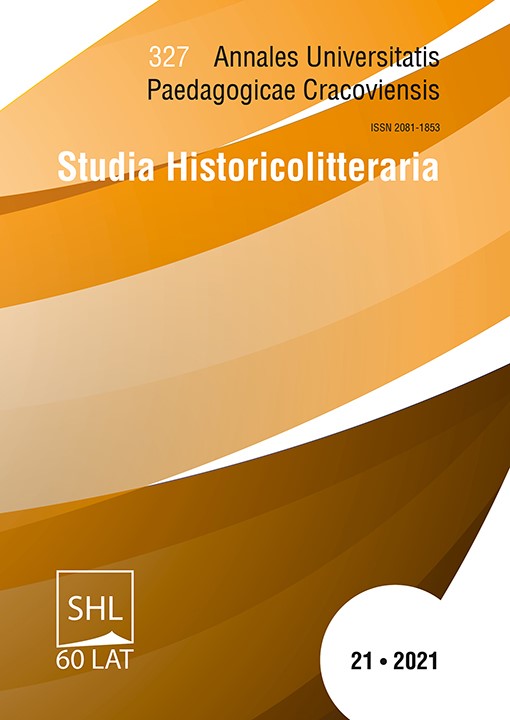Romantyzm krańców Europy. Portugalia, Polska i Chrystus narodów
Main Article Content
Аннотация
This article tentatively provides acomparative outlook on Polish and Portuguese Romanticism. Taking as a starting point the famous parallel between the opposite ends of Europe sketched by the 19th-century historian Joachim Lelewel, the author claims that Polish and Portuguese literature, although they had almost no direct contact with each other, participated in the same system of cultural coordinates established by European Romanticism. At the same time, both nations had some sort of dispute or clash with Europe, developing syndromes of inferiority, as well as megalomaniac visions of their moral superiority. Almeida Garrett and Alexandre Herculano tried to provide a solution, harmonising their country with its European context. The conclusion accentuates the uttermost victory of this harmonising vision, presenting the contemporary Portuguese culture as fully Europeanised and contrasting it with the doubts concerning European identity that may be observed in contemporary Poland.
Скачивания
Article Details

Это произведение доступно по лицензии Creative Commons «Attribution-NonCommercial-NoDerivatives» («Атрибуция — Некоммерческое использование — Без производных произведений») 4.0 Всемирная.
ПОЛИТИКА АВТОРСКИХ ПРАВ
Издатель «Annales Universitatis Paedagogicae Cracoviensis. Studia Historicolitteraria» имеет право использования и распространения всех опубликованных в издании материалов на основании договора неограниченной во времени неисключительной лицензии - предварительно заключенного на неоговоренное время с каждым автором конкретного произведения на оговоренных в том договоре условиях использования.
ПОЛИТИКА ОТКРЫТОГО ДОСТУПА
«Annales Universitatis Paedagogicae Cracoviensis. Studia Historicolitteraria» это издание с открытым доступом, а все его содержание доступно бесплатно для пользователей и организаций на основаниях неисключительной лицензии CreativeCommons (CC BY-NC-ND 4.0). Пользователи могут читать, скачивать, копировать, распространять, производить поиск или переходить по ссылкам к полным текстам статей в этом издании без предварительного согласия издателя либо автора при условии указания источника доступа и авторства данной публикации. Это согласуется с определением открытого доступа BOAI (http://www.soros.org/openaccess).
Библиографические ссылки
Anderson B., Wspólnoty wyobrażone. Rozważania o źródłach i rozprzestrzenianiu się nacjonalizmu, przeł. S. Amsterdamski, Kraków - Warszawa 1997.
Damrosch D., What Is World Literature?, Princeton – Oxford 2003.
Garrett A., Camões. Poema, Paris 1825.
Garrett A., D. Branca ou a conquista do Algarve, Paris 1826.
Garrett A., O Romanceiro, wyd. 5, t. 1, Lisboa 1875.
Garrett A., Theatro de J. B. de Almeida-Garrett, Lisboa 1844.
Garrett A., Viagens na minha terra, Lisboa 1846.
Herculano A., Eu e o clero. Carta ao Em.mo Cardeal-Patriarca, Lisboa 1850.
Herculano A., A harpa do crente. Tentativas poéticas, Lisboa 1838.
Herculano A., Monasticon. Eurico, o presbítero; O Monge de Cister, Lisboa 1847.
Lelewel J., Historyczna paralela Hiszpanii z Polską w XVI, XVII, XVIII wieku, oprac. J. Kieniewicz, Warszawa 2006.
Lourenço E., O labirinto de saudade. Psicanálise mítica do destino português, Lisboa 1978.
Lourenço E., Portugal como destino seguido de Mitologia da Saudade, Lisboa 1999.
Łukaszyk E., Mgławica Pessoa. Historia literatury portugalskiej od romantyzmu do współczesności, Wrocław 2019.
Łukaszyk E., Raczyński w Portugalii. Spuścizna „zderzenia kultur”, „Postscriptum Polonistyczne” 2018, nr 1(21), s. 27–43.
Mickiewicz A., Księgi narodu polskiego i pielgrzymstwa polskiego, Paris 1832.
Quental A. de, Prosas sócio-políticas, oprac. J. Serrão, Lisboa 1982.
Saramago J., Kamienna tratwa, przeł. W. Charchalis, Poznań 2011.
Saramago J., Levantado do Chão, Lisboa 1980.
Sowa J., Fantomowe ciało króla. Peryferyjne zmagania z nowoczesną formą, Kraków 2011.
Tazbir J., W pogoni za Europą, Warszawa 1998.
Vidal L., Mazagan. Miasto, które przepłynęło Atlantyk z Maroka do Amazonii (1769–1783), przeł. M. Berger, Warszawa 2008.
